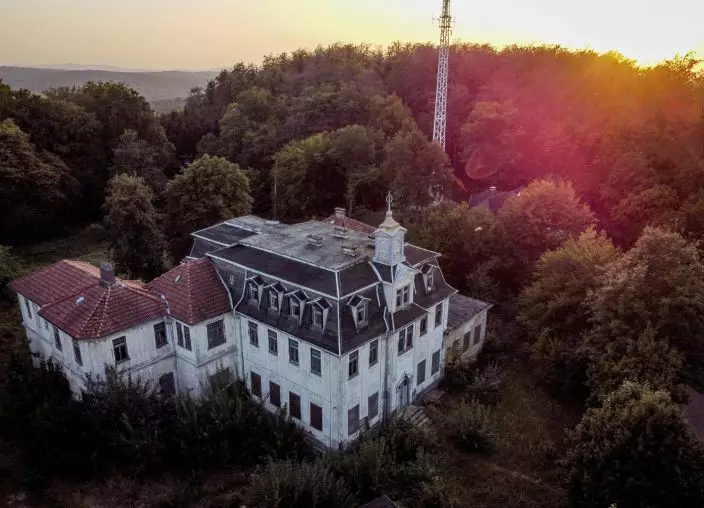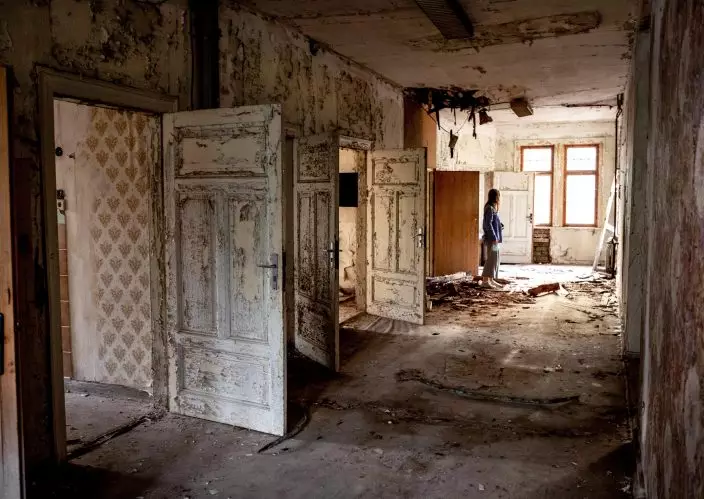Thirty years after Germany was reunited, many once-decrepit city centers in the formerly communist east have been painstakingly restored and new factories have sprung up.
But many companies and facilities didn't survive the abrupt transition to capitalism. The mighty West German mark was introduced to East Germany on July 1, 1990 — a little over three months before reunification on Oct. 3 — and inefficient companies found themselves struggling to compete in a market economy, while demand for eastern products slumped and outdated facilities were shut down.
Casualties of the transition included East Germany's clunky cars, the Trabant and the more upmarket — though still spartan by Western standards — Wartburg.

A farmer works on a large acre in the former border area between East and West Germany in Kaltenwestheim, eastern Germany, Monday, Sept. 21, 2020. GThirty years after Germany was reunited on Oct. 3, 1990, many once-decrepit city centers in the formerly communist east have been painstakingly restored and new factories have sprung up. But many companies and facilities didn't survive the abrupt transition to capitalism inefficient companies found themselves struggling to compete in a market economy, while demand for eastern products slumped and outdated facilities were shut down. (AP PhotoMichael Probst)
The Wartburg factory in Eisenach closed in 1991. Much of it was torn down, though a couple of abandoned production buildings remain. Cars are still produced in Eisenach, but at a new plant built by Western automaker Opel.
Manufacturing plants weren't the only casualties of the end of communism. In Eckardts, a village a few miles from Eisenach, a giant cowshed stands abandoned — a relic of one of the collective farms that dominated agriculture in East Germany. Many people left the former East for the West in the years after reunification, seeking better economic opportunities.
While relics of the communist era and older buildings still awaiting better times can be found in many eastern towns, it's harder to find leftovers of the heavily fortified 1,378-kilometer (856-mile) Berlin Wall border that divided East from West Germany, stretching from the Baltic Sea to the western tip of Czechoslovakia.

The abandoned and wrecked "Fuerstenhof" hotel is seen in Eisenach, eastern Germany, Monday, Sept. 21, 2020. The once famous hotel where Adolf Hitler delivered a speech in 1932 was closed in 1996. Thirty years after Germany was reunited on Oct. 3, 1990, many once-decrepit city centers in the formerly communist east have been painstakingly restored and new factories have sprung up. But many companies and facilities didn't survive the abrupt transition to capitalism inefficient companies found themselves struggling to compete in a market economy, while demand for eastern products slumped and outdated facilities were shut down. (AP PhotoMichael Probst)
A few concrete watch towers can still be found. Elsewhere, fields, woods and buildings have taken over the wide border strip.

A wrecked and abandoned production building of the former East German VEB car factory where BMW and Wartburg cars were built is seen in Eisenach, eastern Germany, Tuesday, Sept. 22, 2020. The factory was closed in 1991. GThirty years after Germany was reunited on Oct. 3, 1990, many once-decrepit city centers in the formerly communist east have been painstakingly restored and new factories have sprung up. But many companies and facilities didn't survive the abrupt transition to capitalism inefficient companies found themselves struggling to compete in a market economy, while demand for eastern products slumped and outdated facilities were shut down. (AP PhotoMichael Probst)

Wolfgang Hofmann stands next to his Wartburg car built in 1974 in front of a wrecked and abandoned production building of the former East German VEB car factory where BMW and Wartburg cars were built in Eisenach, eastern Germany, Tuesday, Sept. 22, 2020. The factory was closed in 1991. Thirty years after Germany was reunited on Oct. 3, 1990, many once-decrepit city centers in the formerly communist east have been painstakingly restored and new factories have sprung up. But many companies and facilities didn't survive the abrupt transition to capitalism inefficient companies found themselves struggling to compete in a market economy, while demand for eastern products slumped and outdated facilities were shut down. (AP PhotoMichael Probst)

A wrecked production hall of an abandoned gas plant is seen in Eisenach, eastern Germany, Tuesday, Sept. 22, 2020. The plant was closed in 1990. Thirty years after Germany was reunited on Oct. 3, 1990, many once-decrepit city centers in the formerly communist east have been painstakingly restored and new factories have sprung up. But many companies and facilities didn't survive the abrupt transition to capitalism inefficient companies found themselves struggling to compete in a market economy, while demand for eastern products slumped and outdated facilities were shut down. (AP PhotoMichael Probst)

A giant cowshed was left behind in the village of Eckardts, eastern Germany, Monday, Sept. 21, 2020. Thirty years after Germany was reunited on Oct. 3, 1990, many once-decrepit city centers in the formerly communist east have been painstakingly restored and new factories have sprung up. But many companies and facilities didn't survive the abrupt transition to capitalism inefficient companies found themselves struggling to compete in a market economy, while demand for eastern products slumped and outdated facilities were shut down. (AP PhotoMichael Probst)

Old-timer cars are seen behind curtains in small production building of the former East German VEB car factory where BMW and Wartburg cars were built in Eisenach, eastern Germany, Tuesday, Sept. 22, 2020. The factory was closed in 1991. Thirty years after Germany was reunited on Oct. 3, 1990, many once-decrepit city centers in the formerly communist east have been painstakingly restored and new factories have sprung up. But many companies and facilities didn't survive the abrupt transition to capitalism inefficient companies found themselves struggling to compete in a market economy, while demand for eastern products slumped and outdated facilities were shut down. (AP PhotoMichael Probst)

A wrecked and abandoned villa built in 1900 stands in a forest near Eisenach, eastern Germany, Monday, Sept. 21, 2020. Thirty years after Germany was reunited on Oct. 3, 1990, many once-decrepit city centers in the formerly communist east have been painstakingly restored and new factories have sprung up. But many companies and facilities didn't survive the abrupt transition to capitalism inefficient companies found themselves struggling to compete in a market economy, while demand for eastern products slumped and outdated facilities were shut down. (AP PhotoMichael Probst)

A woman stands in a wrecked and abandoned villa built in 1900 near Eisenach, eastern Germany, Monday, Sept. 21, 2020. Thirty years after Germany was reunited on Oct. 3, 1990, many once-decrepit city centers in the formerly communist east have been painstakingly restored and new factories have sprung up. But many companies and facilities didn't survive the abrupt transition to capitalism inefficient companies found themselves struggling to compete in a market economy, while demand for eastern products slumped and outdated facilities were shut down. (AP PhotoMichael Probst)


